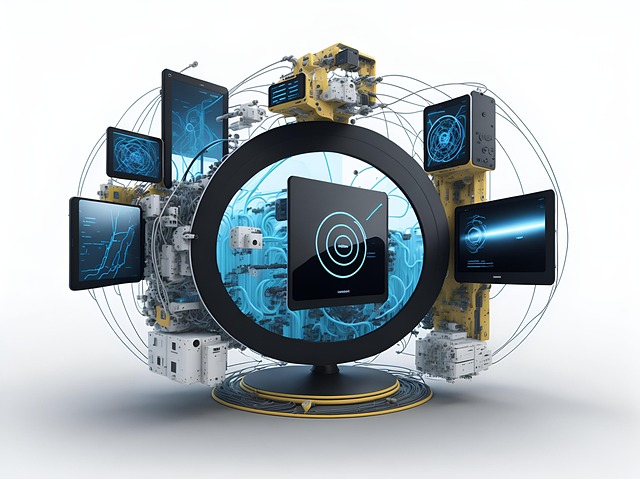In the digital era, chatbot automation for customer engagement is a powerful strategy for businesses. Advanced AI chatbots use NLP for meaningful conversations, learn from interactions, and provide tailored recommendations, enhancing satisfaction and loyalty. In e-commerce, chatbot marketing streamlines lead generation, product recommendations, and support while collecting data for optimization. Effective tracking of customer interactions allows chatbots to adapt responses based on feedback, integrating with CRM systems for strategic decision-making. By leveraging AI automation agencies' expertise, businesses optimize chatbot automation for customer engagement outcomes. Metrics like response accuracy, conversation completion rates, and user satisfaction measure success, helping identify areas for improvement in ecommerce AI workflows.
In today’s digital era, enhancing customer interactions through chatbot automation is a game-changer. This article delves into the transformative power of chatbot automation, specifically designed for customer engagement. We explore key aspects such as understanding the technology, tracking customer interactions, optimizing journeys, and measuring success through relevant metrics. By leveraging these strategies, businesses can streamline operations, improve customer satisfaction, and drive business growth through efficient chatbot automation for customer engagement.
- Understanding Chatbot Automation for Customer Engagement
- Key Features of Effective Customer Interaction Tracking
- Optimizing Customer Journey with Automated Chatbots
- Measuring Success: Metrics for Evaluating Chatbot Performance
Understanding Chatbot Automation for Customer Engagement

In today’s digital era, understanding chatbot automation for customer engagement is paramount for businesses aiming to enhance their customer interactions and drive sales. Chatbots, powered by artificial intelligence (AI), have evolved from simple rule-based systems to sophisticated tools capable of natural language processing. This transformation enables chatbots to engage in meaningful conversations with customers, providing personalized support and guidance across various touchpoints. By leveraging machine learning algorithms, these AI chatbots can learn from customer interactions, adapt their responses, and offer tailored recommendations, thereby increasing customer satisfaction and loyalty.
Chatbot marketing, particularly in the ecommerce space, has seen remarkable growth due to its ability to streamline processes like lead generation, product recommendations, and post-purchase support. An AI chatbot can instantly respond to customer queries, offer product suggestions based on browsing history, and provide after-sales assistance, all while collecting valuable data for future optimization. This not only improves operational efficiency but also creates a dynamic and engaging shopping experience that resonates with modern consumers who expect instant and personalized service.
Key Features of Effective Customer Interaction Tracking

Effective customer interaction tracking is a cornerstone of successful chatbot automation for customer engagement. Key features include real-time data collection and analysis, enabling businesses to instantly identify trends, common queries, and areas of improvement. Advanced chatbots equipped with artificial intelligence (AI) can dynamically adjust responses based on this feedback loop, enhancing the overall user experience.
Moreover, seamless integration with existing customer relationship management (CRM) systems is vital. This allows for a holistic view of customer interactions, providing valuable insights that fuel strategic decision-making. By leveraging AI automation agencies’ expertise in chatbot development and deployment, businesses can ensure their tracking mechanisms are not only robust but also aligned with industry best practices, ultimately driving better customer engagement outcomes.
Optimizing Customer Journey with Automated Chatbots

In today’s digital age, optimizing the customer journey is paramount for businesses to thrive. Chatbot automation for customer engagement plays a pivotal role in achieving this by providing round-the-clock support and personalized interactions. AI agents, or chatbots, can efficiently handle initial customer queries, offering instant responses and guidance, thereby improving overall satisfaction levels. By tracking and analyzing these conversations, businesses gain valuable insights into customer behaviors, preferences, and pain points.
Using chatbot automation, companies can streamline processes and identify areas for improvement. For instance, a sales chatbot can guide customers through the buying process, offer product recommendations, and even handle post-purchase queries. This not only enhances customer experience but also allows human agents to focus on more complex issues, fostering efficient collaboration between technology and human expertise.
Measuring Success: Metrics for Evaluating Chatbot Performance

Measuring success is a vital aspect of chatbot automation for customer engagement. The performance of an AI assistant can be evaluated using various metrics tailored to specific goals. Key Performance Indicators (KPIs) such as response accuracy, conversation completion rates, and user satisfaction scores offer insights into the quality of interactions. By tracking these metrics, businesses in ecommerce ai can identify areas where their chatbot workflows need improvement.
For instance, monitoring the percentage of correctly resolved queries without escalating to human agents showcases the efficiency of the AI workflow. Additionally, analyzing customer feedback and sentiment helps gauge the overall user experience. These insights enable companies to fine-tune their chatbot algorithms, ensuring they deliver accurate and helpful responses, ultimately enhancing customer engagement and satisfaction.
Chatbot automation has transformed the way businesses interact with their customers, offering a more efficient and personalized experience. By tracking and optimizing customer journeys, these chatbots enhance engagement and satisfaction. Through key features like sentiment analysis and data-driven insights, companies can improve response times and resolve queries swiftly. Measuring success with relevant metrics ensures continuous improvement in chatbot performance, making them an indispensable tool for modern customer service. Adopting chatbot automation for customer engagement is a strategic move towards building stronger relationships and driving business growth.
